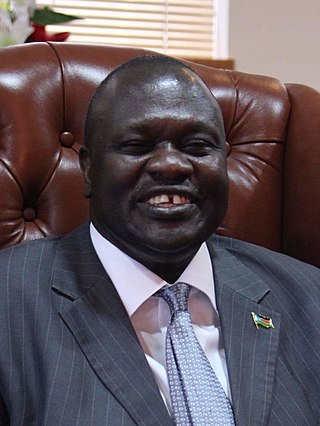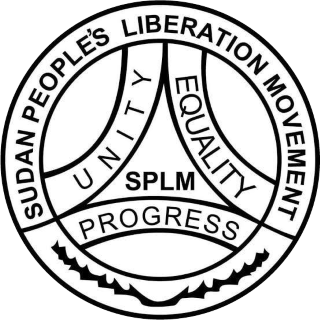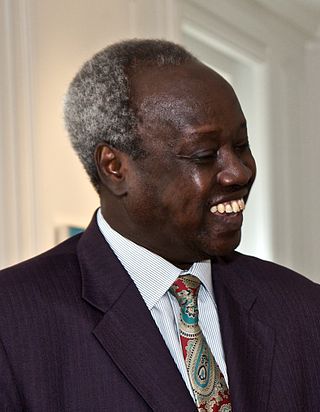| |||||
| Decades: | |||||
|---|---|---|---|---|---|
| See also: | |||||
The following lists events that happened during 2011 in South Sudan .
| |||||
| Decades: | |||||
|---|---|---|---|---|---|
| See also: | |||||
The following lists events that happened during 2011 in South Sudan .

Salva Kiir Mayardit, commonly known as Salva Kiir, is a South Sudanese politician who has been the President of South Sudan since its independence on 9 July 2011. Prior to independence, he was the President of the Government of Southern Sudan, as well as First Vice President of Sudan, from 2005 to 2011. He was named Commander-in-Chief of the Sudan People's Liberation Army (SPLA) in 2005, following the death of John Garang.

Riek Machar Teny Dhurgon is a South Sudanese politician who has served as the First Vice President of South Sudan since 2020.

The Sudan People's Liberation Movement is a political party in South Sudan. It was initially founded as the political wing of the Sudan People's Liberation Army in 1983. On January 9, 2005 the SPLA, the SPLM and the Government of Sudan signed the Comprehensive Peace Agreement, ending the civil war. SPLM then obtained representation in the Government of Sudan, and was the main constituent of the Government of the then semi-autonomous Southern Sudan. When South Sudan became a sovereign state on 9 July 2011, SPLM became the ruling party of the new republic. SPLM branches in Sudan separated themselves from SPLM, forming the Sudan People's Liberation Movement–North. Further factionalism appeared as a result of the 2013–2014 South Sudanese Civil War, with President Salva Kiir leading the SPLM-Juba and former Vice President Riek Machar leading the Sudan People's Liberation Movement-in-Opposition.

The politics of South Sudan concern the system of government in the Republic of South Sudan, a country in East Africa, and the people, organizations, and events involved in it.

Rebecca Nyandeng De Mabior is a South Sudanese politician who currently serves as the 4th Vice President of South Sudan. She is also the head of the Gender and Youth Cluster.

General elections were held in Sudan between 11 and 15 April 2010, extended from the original end date of 13 April. The elections were held to elect the President and National Assembly of Sudan, as well as the President and Legislative Assembly of Southern Sudan. The election brought to the end the transitional period which began when the decades-long Second Sudanese Civil War ended in 2005.

Lieutenant General Nhial Deng Nhial is a South Sudanese politician and a member of the ruling Sudan People's Liberation Movement (SPLM). He was Minister of Foreign Affairs 2011 to 2013 and 2018 to 2019 after having served as the caretaker Minister of Defense since 10 July 2011. Prior to that he served as the pre-independence South Sudanese Minister of SPLA and Veteran Affairs, from 22 December 2008 until 9 July 2011.

A referendum took place in Southern Sudan from 9 to 15 January 2011, on whether the region should remain a part of Sudan or become independent. The referendum was one of the consequences of the 2005 Naivasha Agreement between the Khartoum central government and the Sudan People's Liberation Army/Movement (SPLA/M).

Southern Sudan was an autonomous region consisting of the ten southern states of Sudan between its formation in July 2005 and independence as the Republic of South Sudan in July 2011. The autonomous government was initially established in Rumbek and later moved to Juba. It was bordered by Ethiopia to the east; Kenya, Uganda, and the Democratic Republic of the Congo to the south; and the Central African Republic to the west. To the north lies the predominantly Arab and Muslim region directly under the control of the central government. The region's autonomous status was a condition of a peace agreement between the Sudan People's Liberation Army/Movement (SPLA/M) and the Government of Sudan represented by the National Congress Party ending the Second Sudanese Civil War. The conflict was Africa's longest running civil war.
Louis Lobong Lojore is a South Sudanese Politician and a military governor in the rank of lieutenant general in the South Sudan People's Defence Forces (SSPDF) and the current governor of Eastern Equatoria State in South Sudan. He was the governor of Eastern Equatoria state from 2010 to 2015, governor of Kapoeta State from 2015 to 2020, and has been the governor of the recreated Eastern Equatoria state since 29 June 2020. Lobong is the longest serving governor in South Sudan.

Taban Deng Gai is a South Sudanese politician who has been one of the Vice Presidents of South Sudan in the unity government since February 2020. He served as the First Vice President of South Sudan from 23 July 2016 to February 2020. He was mining minister before being appointed as acting first vice president.

Russia–South Sudan relations are the bilateral relations between Russia and South Sudan.

Philippines–South Sudan relations refers to the bilateral relationship between the Philippines and South Sudan. The Philippines recognized South Sudan as a sovereign state nearly a month after it declared its independence on 9 July 2011. The Philippine embassy in Nairobi has jurisdiction over South Sudan since March 2013. This was held previously by Philippine embassy in Cairo.

China–South Sudan relations refers to the bilateral relations between the People's Republic of China and the Republic of South Sudan. China recognized South Sudan's independence on July 9, 2011.

General elections are due to be held in South Sudan on 22 December 2026, the first since independence.
The following lists events that happened during 2011 in Sudan.
Events in the year 2016 in South Sudan.
Nadia Arop Dudi Mayom is a South Sudanese politician who has served in the South Sudan National Legislative Assembly since 2011, representing Koch County as a member of the Sudan People's Liberation Movement. Dudi is one of two Padang people serving in ministerial positions, alongside Simon Mijok Mijak.
This article lists events in 2022 in South Sudan.
This article lists events in 2024 in South Sudan.